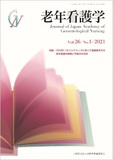Japanese
English
- 販売していません
- Abstract 文献概要
- 参考文献 Reference
抄録
本研究の目的は,自宅退院1か月後の独居高齢者が,疾患や機能障害を抱えてどのような生活体験をしているのかを明らかにすることである.
回復期リハビリテーション病棟から退院した11人を対象に半構造化面接を実施し,質的記述的に分析した.その結果【いまはできないこともあるがまあまあな状態だ】【自分の力や他者の力を借りて守るべきことを行う】【家族や親類に感謝しつつこれ以上負担をかけることを自粛する】【生活に欠かせないものや楽しみがある】【いつかくる自分の衰え・死・災害に向き合い対処する】【ひとり暮らしは自分で采配できる反面,責任と覚悟が伴う】という体験をしていることがわかった.一方,【信念がありやってよいことと異なることを慎重に行う】体験もしており,独居高齢者の信念に基づく行動を尊重したうえで,退院時に指導されたことと異なる行動によるリスクを最小限にする支援の必要性が示唆された.
This study aims to identify experiences in daily life of older adults who lived alone with diseases or functional disorders one month after being discharged from hospital to their homes. We conducted semi-structured interviews to 11 people discharged from convalescent rehabilitation wards. The data were analyzed using qualitative and descriptive analysis. The results showed that they experienced “being not too bad, although there are things which are impossible to do now,” “doing what I should do to protect by myself or with help,” “thanking family and relatives and restraining myself from further burdening them,” “having indispensable things and pleasures for life,” “facing and coping with my weakening, death, and disasters that will come someday,” and “finding that living alone enables me to call the shots by myself, but it comes with responsibility and determination.” The older adults also experienced “having belief and carefully doing things good to do and not good to do.” The findings suggested that the need for support to minimize the risks caused by different actions from the instructions given at the time of discharge, while simultaneously respecting the actions of older adults living alone taken based on their beliefs.
Copyright © 2021, Japan Academy of Gerontological Nursing All rights reserved.


